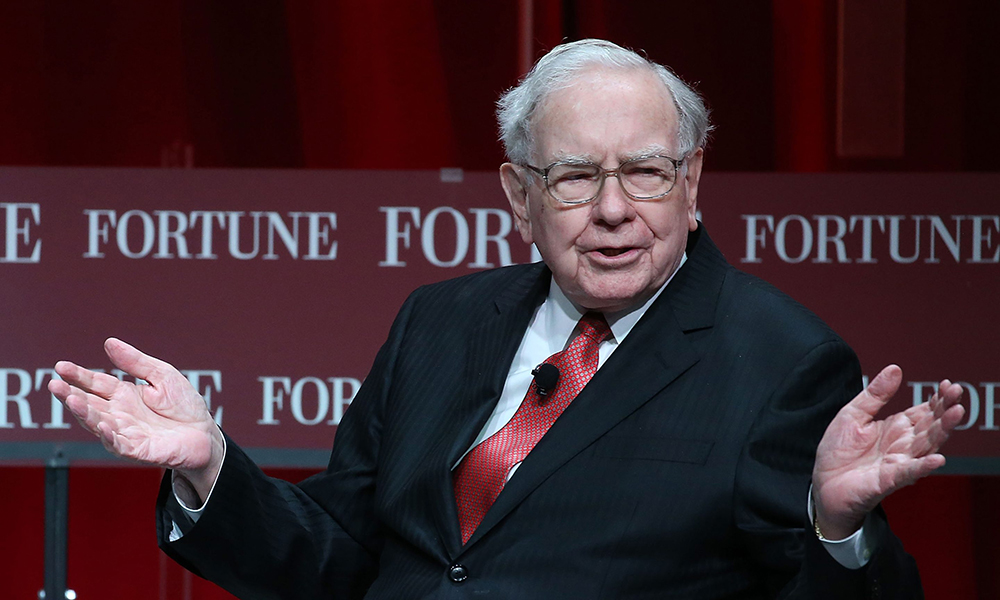
在有些人看来,伯克希尔-哈撒韦(Berkshire Hathaway Inc.)减持苹果公司(Apple Inc.)的股份,可以解释为该公司对iPhone手机生产商的增长故事缺乏信心。但许多华尔街人士呼吁投资者不要理会这则消息,并保持冷静。
沃伦·巴菲特领导的庞然大物伯克希尔-哈撒韦上周六披露,其在第二季度出售了在科技巨头苹果的近半持股。目前其持股的价值约为840亿美元,远低于3月底的约1,400亿美元。此次减持正值美股的一波火爆行情,使苹果股价上涨了23%,标普500指数屡创新高。
自2016年沃伦·巴菲特首次披露其在苹果的持股以来,苹果股价暴涨约900%,巩固了其在业内的主导地位,同时为沃伦·巴菲特创造了价值数十亿美元的未实现利润。
Integrity Asset Management的高级投资组合经理乔·吉尔伯特表示:“巴菲特减持苹果股份只是为了管理风险。如果巴菲特对评估的长期可行性有任何顾虑,他可以直接清仓。与巴菲特其他减持操作类似,巴菲特在苹果公司有大量未实现收益。”
就在伯克希尔公布其投资组合的几天前,苹果公司几天前刚刚发布了季度业绩。苹果的业绩报告显示,公司恢复了收入增长,并暗示未来几个季度新人工智能功能将刺激iPhone手机的销量。营收报告公布后,尽管市场上出现整体抛售,但苹果股价稳定,最终在上周结束时上涨。
巴菲特一直被誉为“奥马哈先知”。虽然他的投资策略确实不容忽视,但近几年,伯克希尔在苹果的持股规模庞大,因此一些投资者开始猜测伯克希尔是否应该通过减持来平衡持股。即使在减持之后,苹果依旧是伯克希尔规模最大的单一持股。
美国财务研究分析中心(CFRA)的研究分析师凯西·塞弗特表示:“当你的持仓规模过大时,你可以兑现一部分利润,并减少集中风险。”她补充说:“伯克希尔-哈撒韦的投资组合依旧相当集中。”
这也并非伯克希尔首次减持苹果股份。在5月召开的年度会议上,该公司公布在今年第一季度已经进行过减持。当时,巴菲特向投资者暗示,税务影响可能是此次减持的决定因素之一。
苹果和伯克希尔-哈撒韦的代表均未回应在周日正常工作时间以外发出的置评请求。
在最新的公告发布之际,人们普遍担心美国可能即将陷入经济衰退。上周五公布的就业数据不及预期,引发了人们对美联储降息可能已经等待太久的担忧,使纳斯达克100指数进入了技术性回调,芝加哥期权交易所波动率指数(Cboe Volatility Index)接近25。
微软(Microsoft Corp.)、亚马逊(Amazon.com Inc.)和Alphabet等其他大盘股均低于7月初的历史最高水平。同期纳斯达克100成分股的市值共缩水超过3万亿美元,英伟达(Nvidia Corp.)和特斯拉(Tesla Inc.)的市值缩水超过了20%。而苹果公司的市值较历史最高点下降了约6%。
扎克投资管理公司(Zacks Investment Management)的客户组合经理布莱恩·马尔伯里认为,伯克希尔与越来越多投资者一样,希望看到更多证据,证明苹果的人工智能投资能够带来收入增长,并且他们认为人工智能投资带来回报的速度不够快。
彭博社汇总的数据显示,截至7月中旬,苹果公司的估值倍数为未来利润的33倍,比标普500指数高出11点,上一次出现这种差异还是在新冠疫情和金融危机之后。尽管苹果的估值较高,但马尔伯里认为,投资者持有苹果股份依旧是明智的选择。他表示:“苹果公司的资产负债表状况依旧健康,而且其收益增长速度仍将快于市场整体增长速度。”
包括维德布什(Wedbush)分析师丹·埃弗斯在内的其他人提到了苹果公司的品牌忠诚度和未来增长。他认为苹果即将迎来一次重要的升级周期,将在2025年和2026年推动收入增长。
埃弗斯表示:“虽然有人可能将巴菲特减持解读为对信心的担忧,但苹果刚刚交出了一份强劲的季度业绩,并且即将进入一个由人工智能驱动的超级周期,我们并不认为现在是退出的恰当时机。”
当然,苹果并非伯克希尔最近减持的唯一一支股票。自7月中旬以来,该公司将美国银行的股份减持8.8%。有人认为,这表明巴菲特并不认为这两家公司存在任何问题,而是押注美国消费者和整体经济即将陷入疲软。
Clearstead Advisors公司的高级董事总经理吉姆·阿瓦德表示:“巴菲特可能感觉美国经济即将陷入衰退,因此现在筹集现金,未来可以以较低的价格进行收购。或许他嗅到了未来的商机。”(财富中文网)
译者:刘进龙
审校:汪皓
在有些人看来,伯克希尔-哈撒韦(Berkshire Hathaway Inc.)减持苹果公司(Apple Inc.)的股份,可以解释为该公司对iPhone手机生产商的增长故事缺乏信心。但许多华尔街人士呼吁投资者不要理会这则消息,并保持冷静。
沃伦·巴菲特领导的庞然大物伯克希尔-哈撒韦上周六披露,其在第二季度出售了在科技巨头苹果的近半持股。目前其持股的价值约为840亿美元,远低于3月底的约1,400亿美元。此次减持正值美股的一波火爆行情,使苹果股价上涨了23%,标普500指数屡创新高。
自2016年沃伦·巴菲特首次披露其在苹果的持股以来,苹果股价暴涨约900%,巩固了其在业内的主导地位,同时为沃伦·巴菲特创造了价值数十亿美元的未实现利润。
Integrity Asset Management的高级投资组合经理乔·吉尔伯特表示:“巴菲特减持苹果股份只是为了管理风险。如果巴菲特对评估的长期可行性有任何顾虑,他可以直接清仓。与巴菲特其他减持操作类似,巴菲特在苹果公司有大量未实现收益。”
就在伯克希尔公布其投资组合的几天前,苹果公司几天前刚刚发布了季度业绩。苹果的业绩报告显示,公司恢复了收入增长,并暗示未来几个季度新人工智能功能将刺激iPhone手机的销量。营收报告公布后,尽管市场上出现整体抛售,但苹果股价稳定,最终在上周结束时上涨。
巴菲特一直被誉为“奥马哈先知”。虽然他的投资策略确实不容忽视,但近几年,伯克希尔在苹果的持股规模庞大,因此一些投资者开始猜测伯克希尔是否应该通过减持来平衡持股。即使在减持之后,苹果依旧是伯克希尔规模最大的单一持股。
美国财务研究分析中心(CFRA)的研究分析师凯西·塞弗特表示:“当你的持仓规模过大时,你可以兑现一部分利润,并减少集中风险。”她补充说:“伯克希尔-哈撒韦的投资组合依旧相当集中。”
这也并非伯克希尔首次减持苹果股份。在5月召开的年度会议上,该公司公布在今年第一季度已经进行过减持。当时,巴菲特向投资者暗示,税务影响可能是此次减持的决定因素之一。
苹果和伯克希尔-哈撒韦的代表均未回应在周日正常工作时间以外发出的置评请求。
在最新的公告发布之际,人们普遍担心美国可能即将陷入经济衰退。上周五公布的就业数据不及预期,引发了人们对美联储降息可能已经等待太久的担忧,使纳斯达克100指数进入了技术性回调,芝加哥期权交易所波动率指数(Cboe Volatility Index)接近25。
微软(Microsoft Corp.)、亚马逊(Amazon.com Inc.)和Alphabet等其他大盘股均低于7月初的历史最高水平。同期纳斯达克100成分股的市值共缩水超过3万亿美元,英伟达(Nvidia Corp.)和特斯拉(Tesla Inc.)的市值缩水超过了20%。而苹果公司的市值较历史最高点下降了约6%。
扎克投资管理公司(Zacks Investment Management)的客户组合经理布莱恩·马尔伯里认为,伯克希尔与越来越多投资者一样,希望看到更多证据,证明苹果的人工智能投资能够带来收入增长,并且他们认为人工智能投资带来回报的速度不够快。
彭博社汇总的数据显示,截至7月中旬,苹果公司的估值倍数为未来利润的33倍,比标普500指数高出11点,上一次出现这种差异还是在新冠疫情和金融危机之后。尽管苹果的估值较高,但马尔伯里认为,投资者持有苹果股份依旧是明智的选择。他表示:“苹果公司的资产负债表状况依旧健康,而且其收益增长速度仍将快于市场整体增长速度。”
包括维德布什(Wedbush)分析师丹·埃弗斯在内的其他人提到了苹果公司的品牌忠诚度和未来增长。他认为苹果即将迎来一次重要的升级周期,将在2025年和2026年推动收入增长。
埃弗斯表示:“虽然有人可能将巴菲特减持解读为对信心的担忧,但苹果刚刚交出了一份强劲的季度业绩,并且即将进入一个由人工智能驱动的超级周期,我们并不认为现在是退出的恰当时机。”
当然,苹果并非伯克希尔最近减持的唯一一支股票。自7月中旬以来,该公司将美国银行的股份减持8.8%。有人认为,这表明巴菲特并不认为这两家公司存在任何问题,而是押注美国消费者和整体经济即将陷入疲软。
Clearstead Advisors公司的高级董事总经理吉姆·阿瓦德表示:“巴菲特可能感觉美国经济即将陷入衰退,因此现在筹集现金,未来可以以较低的价格进行收购。或许他嗅到了未来的商机。”(财富中文网)
译者:刘进龙
审校:汪皓
To some, Berkshire Hathaway Inc.’s gutting of its Apple Inc. stake could be interpreted as a lack of conviction in the iPhone maker’s growth story. But many on Wall Street are urging investors to look past the news and stay calm.
The Warren Buffett-led conglomerate revealed Saturday that it sold almost half of its position in the tech giant during the second quarter. Its stake now stands at roughly $84 billion, down from about $140 billion at the end of March. The selling took place during a torrid run in the stock market that sent Apple shares 23% higher and pushed the S&P 500 from one record to the next.
Since 2016, when Warren Buffett first disclosed its stake in Apple, its shares have soared almost 900% as the company cemented its grip on the industry, delivering Berkshire billions of dollars worth of unrealized profits along the way.
“Buffett’s reduction of his Apple stake is merely about risk management,” said Joe Gilbert, senior portfolio manager at Integrity Asset Management. “If there were any concerns about the longer-term viability of Apple, Buffett would have exited the entire position. Similar to Berkshire’s other stock position reductions, Buffett has meaningful unrealized gains.”
Berkshire’s portfolio reveal comes just days after Apple released its own quarterly results, which showed a return to revenue growth and signaled that new AI features will boost iPhone sales in the coming quarters. Apple shares were steady after the earnings report and ultimately ended the week higher despite the broader selloff.
While the investment strategy of Buffett — long known as the Oracle of Omaha — is hard to ignore, Berkshire’s stake in Apple had gotten so large in recent years that some investors had begun to wonder whether the firm would have to trim its position to balance out its holdings. Even after the unwind, Apple remains Berkshire’s largest single position.
“If you’ve got this outsized position you take some profits and you reduce some of your concentration risk,” said Cathy Seifert, a research analyst at CFRA. “They still have a fairly concentrated portfolio,” she added.
It’s also not the first time Berkshire has cut its stake in Apple. At its annual meeting in May, the firm revealed that it had reduced its position during the first quarter of the year. At the time, Buffett hinted to investors that tax implications may have played a role in the sale.
Representatives for Apple and Berkshire Hathaway didn’t respond to requests for comment outside of regular business hours on Sunday.
The latest announcement comes amid broader concern about the potential of an economic downturn ahead. Worse-than-expected jobs data on Friday stoked fears the Federal Reserve may have waited too long to start reducing interest rates, sending the Nasdaq 100 Index into a technical correction and the Cboe Volatility Index toward 25.
Megacap peers including Microsoft Corp., Amazon.com Inc. and Alphabet Inc. have all tumbled from record highs reached in early July. In total, Nasdaq 100 members have shed more than $3 trillion in value over that stretch with both Nvidia Corp. and Tesla Inc. each seeing declines of more than 20%. Apple, meanwhile, is down about 6% from its all-time high.
It’s possible that Berkshire, like an increasing number of investors, wants to see more proof that Apple’s AI investments will pay off with revenue growth and isn’t convinced that’s happening fast enough, according to Brian Mulberry, client portfolio manager at Zacks Investment Management.
Apple’s valuation multiple — at 33 times future profits as of mid-July — was 11 points higher than that of the broader S&P 500, a gap that was last seen in the aftermath of the pandemic and the financial crisis, data compiled by Bloomberg show. But despite the valuation premium, Mulberry thinks it still makes sense for investors to own Apple shares. “They’re still in a healthy balance sheet position and they’re still going to grow earnings faster than the broader market,” he said.
Others, including Wedbush analyst Dan Ives, point to Apple’s brand loyalty and future growth – it’s on the cusp of what he thinks is a major upgrade cycle that will drive revenue growth in 2025 and 2026.
“While some could read this as confidence worry, Apple just delivered a robust quarter with a massive AI driven super cycle ahead and we do not view this as the time to hit the exit button,” Ives said.
Of course, Apple isn’t the only stake that Berkshire has trimmed lately — it’s been unloading sharesof Bank of America Corp., cutting its position by 8.8% since mid-July. Some see that as a sign that Buffett doesn’t see any individual problems with either company, but is instead betting that the US consumer and broader economy are set to weaken.
“Buffett may feel we’re about to go into a recession, so by raising cash now he will be able to buy companies cheap later on,” said Jim Awad, senior managing director at Clearstead Advisors. “He may smell an opportunity coming.”






